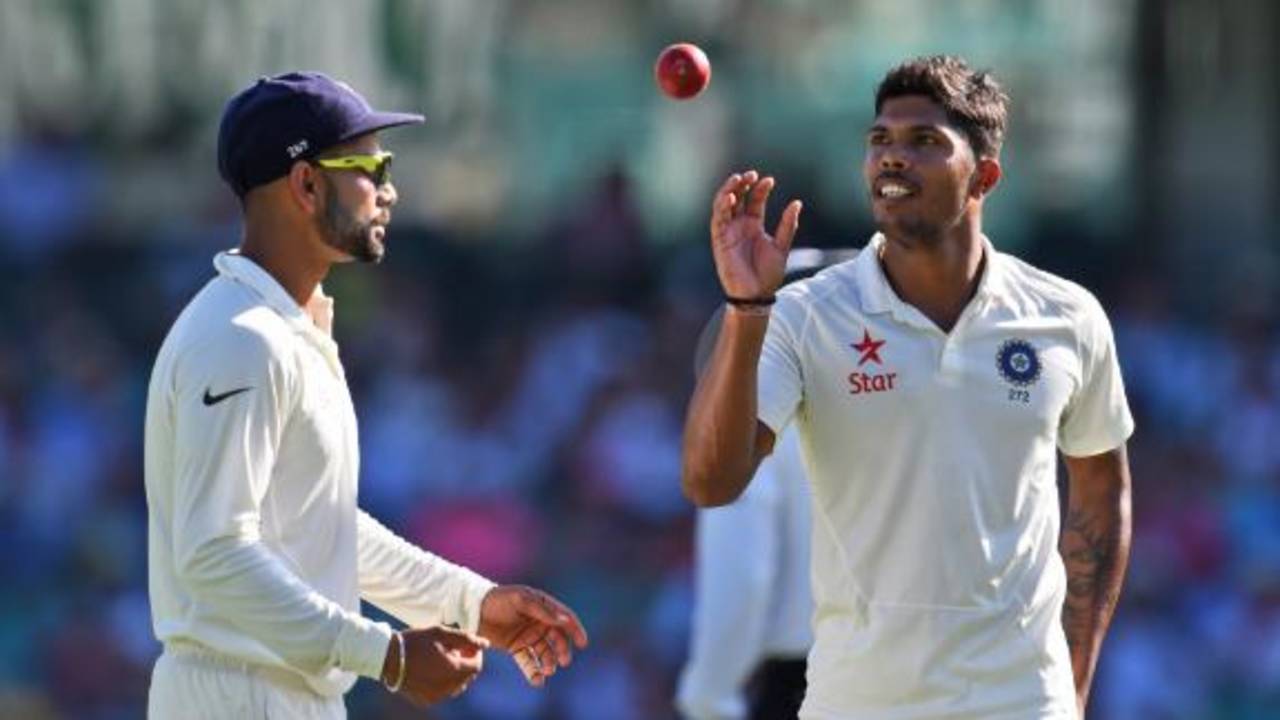Track is dead, but we are confident of winning - Yadav
Umesh Yadav is confident of India prising out the eight wickets they need to seal the series 3-0 despite South Africa batting out 72 overs on Day 4 without much discomfort
Sidharth Monga
Dec 6, 2015, 2:26 PM
Umesh Yadav, the India fast bowler, is confident the team should be able to wrap up the Test on the final day after South Africa raised hopes of a draw by batting out 72 overs for the loss of just two wickets. They might have scored just 72 runs in those 72 overs, but already, only one of their innings in this series has been longer than this. India had cause for concern in the fact that the few edges that were produced kept dying in front of the catching men despite their creeping up close.
"Today also they gave catches, but they were lucky that those catches fell in the gaps rather than going to the fielders," Yadav said, when asked if the team was confident of taking eight wickets in a day on this pitch. "So I don't think they will survive the whole day without giving any catches. You never know, the wicket's character might change tomorrow. It might start turning more."
Yadav also said the pitch had become really slow. "If you see any pitch, after third or fourth day, it starts getting slower and slower," he said. "You don't get the desirable pace or bounce from the wicket. This is happening with this wicket also as the pace of this track is gone. Even if you are bowling a bouncer, you are not able to work up the desired pace or bounce. It's travelling easy."
India went as far as to sacrifice a few overs by bowling Ishant Sharma and Yadav from round the wicket so as to create some rough. "Yes, we tried to create a few patches so that the spinners get some kind of help," Yadav said. "With no pace or bounce, and with no reverse, we thought any rough that we could create will be good for our spinners."
The other challenge, Yadav said, was the reduced mistakes when batsmen refuse to play any shots. "It's a surprise as we did not think that they would play like this," Yadav said. "The way they are defending is a surprise because they are not even trying to play a shot. Even the deliveries in which they can score are being defended.
"It becomes a challenge when the batsman does not play a shot as chances of getting a player out decreases. When a batsman doesn't take any initiative then even if you bowl a good delivery, he will just block it out."
Ishant Sharma had recently remarked that taking wickets in domestic first-class matches can be more difficult than in Tests because the batsmen don't always look to score runs. Yadav was asked if his recent experience in domestic cricket helped. "I can tell you this kind of cricket can be very boring, because you just are bowling over after over and nothing is happening," Yadav said. "It becomes so boring that you start thinking as to whether something will happen or not. But yes, there is pressure on them and that's the reason they are blocking everything and trying to stretch this game. Our first target tomorrow morning will be to dismiss them as quickly as possible."
The biggest question that nobody has answered so far is the reasoning behind not enforcing the follow-on. India had South Africa on the mat when the first innings finished. They were behind 213 runs. Only once have they managed to cross that mark in this series. At the time the decision was made, India had seven minutes to go to stumps, which would have really tested the openers against R Ashwin and Ravindra Jadeja. Then the bowlers would have had a whole night to rest; not as though they would have been desperate for a rest: they had bowled only 49.3 overs in the first innings.
Yadav was asked if the team wondered the correct decision had been made in the dying moments of day two, but all he did was defend the timing of the declaration. "Don't know if we made a mistake, but it is common strategy that we wanted to score runs and set a target which makes the team comfortable," he reasoned. "Then we thought of attacking. We thought the more we score in the first hour, better it will be for us and we did score runs in that first hour. Normally, I don't think there will be much of a problem to get them out as we have lot of time at our disposal."
Sidharth Monga is an assistant editor at ESPNcricinfo
